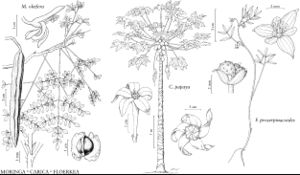Moringaceae
Trees or shrubs; glabrous or puberulent; roots tuberous [massive, fibrous, or shrubs canelike with underground tubers], (producing glucosinolates and isothiocyanates, especially in roots and leaves; strongly odoriferous). Stems erect to pendent; unbranched [branched]. Leaves (drought-deciduous) alternate, (imparipinnate), compound; stipules present (glandular); petiole present; leaflets opposite, blade margins entire. Inflorescences axillary, paniculate, with (2–)3–4(–5) orders of branching; bracts (and bracteoles) usually present (glandular). Pedicels present. Flowers strongly zygomorphic [nearly actinomorphic]; perianth and androecium perigynous; sepals 5, distinct; petals 5 (bannerlike petal borne abaxially), distinct; stamens 5, opposite petals (inserted on rim of hypanthium); staminodes [3–]5, similar to filaments, alternate with stamens; anthers monothecal, bisporangiate; ovary 3-carpellate, 1-locular, (on gynophore); placentation probably marginal (sometimes interpreted as medial); ovules anatropous; style 1 (hollow, with a gaping stigmatic aperture). Fruits capsular, valvate, laxly dehiscent, fibrous. Seeds 10–35, brown, globular, winged or not; cotyledons oily.
Distribution
Introduced; sw Asia, sw, ne Africa, Indian Ocean Islands (Madagascar), introduced also pantropically.
Discussion
Genus 1, species 13 (1 in the flora).
Moringaceae are closely related to Caricaceae, with which they share glandular appendages at the apex of the petiole.
The bark of Moringaceae is conspicuous with bundles of phloem, schizogenous gum ducts are present in the pith and also on trauma in the bark, and exudes a straw- or pinkish-colored gum. The wood is white or yellowish and the plants are fibrous to mostly parenchymatous.
